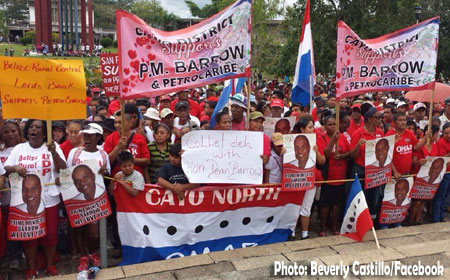BELIZE CITY, Tues. June 23, 2015–When the House of Representatives meets this Friday, June 26, a bill to amend the Petrocaribe Loans Act, along with two supplementary appropriation bills to cover roughly $70 million in unbudgeted spending for fiscal year 2014/2015 and fiscal year 2015/2016, will be tabled for passage at that sitting.
There are three major provisions in the proposed amendment.
The first addresses criticism over the spending of Petrocaribe funds, and whether such spending complies with financial regulations that govern the use of public funds.
The new provision says that, “The money borrowed from APBEL [Alba Petrocaribe Belize Limited] shall be kept in a fund at the Central Bank of Belize, which fund shall form part of the Consolidated Revenue Fund of Belize, and may be withdrawn from time to time as the need arises.
“The withdrawal and spending of the said money from the Central Bank shall be in full measure subject to the Finance and Audit (Reform) Act, and all other Laws, Regulations and Procedures applicable to monies forming part of the Consolidated Revenue Fund of Belize.”
The second provision addresses the purposes for which Petrocaribe funds can be used. Enshrined in the proposed amendment is a clause which will commit Petrocaribe funds to pay hundreds of millions in compensation to the former owners of Belize Telemedia Limited and the Belize Electricity Limited, as well as to finance the buy-back of Belize’s billion-dollar Superbond.
The amendment proposes that, “The money borrowed from APBEL may be used to finance capital projects, provide social and community assistance to the poor, socially marginalized and other sectors of the community, pay compensation relating to Government’s nationalization of Belize Electricity Limited (BEL) and Belize Telemedia Ltd (BTL), assist with commercial and SuperBond debt buyback, and for any other similar legitimate purposes…”
A third major provision in the proposed bill calls for reporting on Petrocaribe spending every quarter – an entirely new feature of the law.
The provision will say that “…all money borrowed from APBEL shall be reported to the National Assembly quarterly, and shall require the passage of a Retrospective Supplementary Allocation for any spending done in the reporting quarter that was not provided for in the Annual Estimates of Revenue and Expenditure. At the time of quarterly reporting, a Prospective Supplementary Allocation shall also be required for all spending proposed to be done in the following quarter, if such spending had not been provided for in the Annual Estimates of Revenue and Expenditure.”
The law will still permit the Government to contract Petrocaribe debt above the normal limit of $10 million for which prior parliamentary approval is generally required, as the special exemption of Petrocaribe debt contained in the Petrocaribe Loans Act will remain intact.
While the Petrocaribe amendment is the agenda item that will garner the most public interest, another major bill will be tabled for approval to retrospectively validate the collection of the cruise tourism head tax, as far back as 2000.
The Cruise Ship Passenger Tax and Validation Bill, 2015, makes provision for the Belize Tourism Board (BTB) to levy, charge and collect a tax on each cruise passenger entering and leaving Belize, but specifies that the law only applies to passengers who use the Fort Street Tourism Village (FSTV).
The bill makes no mention of the Harvest Caye cruise port in southern Belize, which is now under construction; the proposed Stake Bank cruise port, which is planned for offshore Belize City; or any future cruise port.
The proposed bill specifically says that it “…applies to each manifested cruise ship passenger on a cruise ship entering and leaving Belize and which tenders its passengers to the Fort Street Tourism Village.”
Currently, the BTB collects US$7, of which US$4 goes to the FSTV; however, the new law specifies that the BTB would have the power to set “…the rate of tax payable and any variation thereof…” and the ratio used to determine how much each party gets would be agreed among the parties.
According to the proposed amendment, the law would apply “…during the period commencing on the 20th day of December, 2000 and immediately preceding the commencement of this Act, and the distribution of the tax collected between the Fort Street Tourism Village or its predecessor and the Government of Belize or its nominee, are hereby validated retrospectively…”
It adds that “…all such taxes levied or collected or purporting to have been levied or collected and distributed during that period are hereby validated retrospectively and deemed to have always been validly levied or collected and distributed in accordance with this Act.”
Last week, Supreme Court Justice Courtenay Abel began hearings into the case filed by Michael Feinstein, former stakeholder in FSTV, challenging the legality of the cruise tourism head tax, which Government counsel Nigel Hawke has argued was not applied as a tax but as an administrative fee —although the agreement between FSTV and the government expressly calls it a tax. That case continues to be heard today, June 24.
Three other bills are due to be tabled in Parliament on Friday which pertain to Belize’s protected areas system, the Protected Areas Conservation Trust and the Caribbean Community Climate Change Center based here in Belize.

